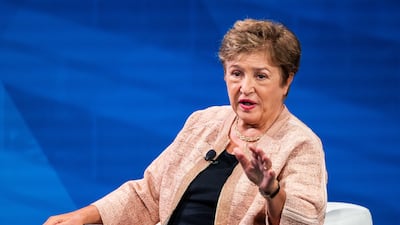The head of the International Monetary Fund has refused to declare victory over inflation even as the world's major economies have begun cutting interest rates, saying high prices and conflict in the Middle East pose a cautious outlook.
Although central banks such as the US Federal Reserve and the European Central Bank entered a new era of policy easing after ramping up rates in response to 2022's inflation surge, IMF managing director Kristalina Georgieva said not to “expect any victory parties” during the IMF and World Bank Annual Meetings next week.
Her comments came shortly after the ECB lowered its key rate to 3.25 per cent, the central bank's third quarter-point reduction this year. Meanwhile, futures markets are projecting the Fed will cut the US target range for a second straight meeting in November to 4.50 to 4.75 per cent. Despite these measures, Ms Georgieva said high interest rates have been particularly painful for low-income countries.
“For one thing, inflation rates may be falling, but the higher price level that we feel in our wallets is here to stay,” she said in prepared remarks at the IMF headquarters in Washington. “At the country level and at the level of individuals, inflation always hits the poor the hardest,” she said.
Ms Georgieva said that “even worse” than the toll of high interest rates on low-income states are the escalating tensions in the Middle East, which have cast a shadow of uncertainty over regional economies and global oil and gas markets. A separate report from the World Bank released this week lowered its growth projection in the region from 2.7 per cent to 2.2 per cent due to the Gaza war.
More than 42,400 people have been killed in Gaza since the war began in October last year, according to the Health Ministry. And more than 2,300 people have been killed in Lebanon, which has been bombarded by Israeli air strikes in the war's latest chapter.
“Its humanitarian impact, alongside the prolonged wars in Ukraine and elsewhere, is heartbreaking,” Ms Georgieva said.
Growth 'far from good enough'
Ms Georgieva also delivered a grim warning on medium-term growth prospects, predicting a “difficult future”. IMF projections show an “unforgiving combination” of low growth and high debt.
Growth over the medium term will not be good enough to eliminate world poverty or generate enough tax revenue to service debt loads. The IMF chief said public debt is significantly higher than before the Covid-19 pandemic and, in one scenario, debt could reach roughly 20 percentage points of gross domestic product above the multilateral lender's baseline.
“My message today: we can do better,” she said.
Ms Georgieva pointed to several reforms to address medium-term growth, including adding more people to the labour force, enhancing productivity and mobilising capital. She also called on countries to deliver more fiscal restraint. A separate IMF report released this week showed the world's total public debt is set to surpass $100 trillion for the first time this year.
The warning comes less than a month before the US presidential election, where campaign promises by Republican nominee Donald Trump and Democratic nominee Kamala Harris would both contribute to new debt. Mr Trump's tax cuts would increase the US debt by $7.5 trillion, while Ms Harris would add roughly $3.5 trillion, according to a report from the Committee for a Responsible Federal Budget.
Ms Georgieva also underscored areas that require global co-operation, including climate change and artificial intelligence, referring to AI as “our single best shot at higher productivity”.


